25+ Things That Can Go Wrong When Traveling With a Disability in Europe
By John Sage
Many things can go wrong when traveling in Europe with a disability but that shouldn’t keep you from the European vacation of a lifetime! With the right amount of expertise and preparation, including reading through the 25 Things That Can Go Wrong When Traveling With a Disability described below, you’re already on track to have a smooth, worry-free time abroad. The list below is based on my wheelchair travels to 70+ European cities as well as planning countless trips for other disabled travelers.
25 Things That Can Go Wrong When Traveling With a Disability
1) Blowing an electric charger on a motorized wheelchair or scooter – I heard this story after the fact from a client who only booked part of his Belgium trip with us. The hotel staff gave him some bad advice, and as a result, he accidentally ruined the only electric wheelchair charger he had brought on the trip! The client had to delay his travels to the next city and wait for a super-expensive part to be shipped from the US… using a manual wheelchair in the meantime.
bring an extra or be sure you can easily replace it!
2) Entering ancient ruins with no easy exit – This happened to me at Ephesus. The driver dropped us off at the top gate and I had to roll over ancient ruins all the way to the lower gate. That was a tough trip! Be sure you know the accessibility of every site that you visit.
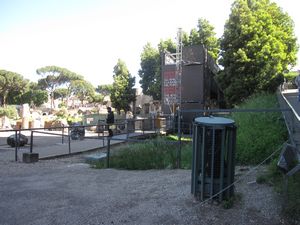 3) Relying on outdated internet information – The internet contains a great deal of accessible travel advice, but unfortunately much of it is outdated! You might skip the Roman Forum if you read an old article written before the elevator was installed (shown in the photo on the right).
3) Relying on outdated internet information – The internet contains a great deal of accessible travel advice, but unfortunately much of it is outdated! You might skip the Roman Forum if you read an old article written before the elevator was installed (shown in the photo on the right).
You might arrive in Venice expecting to use the wheelchair bridge lifts you read about on the internet, however, they were taken out of service years ago! Or you might show up excited about the accessible portion of the Pompeii ruins only to find out it has been closed for renovations.
accessibility information that you read is up to date.
4) Hotel staff gives away your accessible room to another guest – Unfortunately, this happens far too often to people traveling with a disability. Someone working at the front desk doesn’t see the computer remark that you’ve requested an accessible room, and they put you in the wrong room! Be sure that you have a list of nearby accessible hotels so that your vacation can continue uninterrupted!
5) Hotel staff providing incorrect accessibility information – A few years ago, I had a woman call me who had booked a hotel in Paris months before her trip and, just before she was about to leave, she spoke with a different person at the hotel and found out there were 2 steps to reach the elevator! Many people working at hotels aren’t fully aware of the accessibility needs of disabled travelers. You should double-check all accessibility features far in advance or rely on someone who has seen and assessed them first-hand.
6) Staying in a dirty or non-wheelchair accessible neighborhood – Unfortunately, even the best hotel search engines or hotel websites don’t give an accurate description of the neighborhood surrounding the hotel. You might pick a 5 star hotel that is located in a terrible neighborhood!
or this Athens neighborhood with sidewalk steps (on the right)??

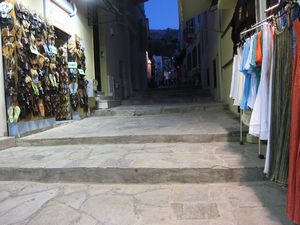
7) Needing a replacement wheelchair part – When I was traveling in a wheelchair alone in Normandy, I managed to get a flat tire on my wheelchair. Like a good Boy Scout, I had brought a spare inner tube…but I managed to puncture that one too! Bike shops were closed on Sunday, and I learned a helpful “can’t-miss way to fix a flat” (listed in my 101 Disabled Travel Tips).
8) Over paying #1 – We get requests all the time from brick and mortar travel agents who need our assistance. A disabled traveler asks for their help and, instead of referring them elsewhere, the travel agent will book the trip through us and put their own 10% mark-up on it…without adding any value to the trip!
9) Over paying #2 – As mentioned in my Top 10 Europe Handicapped Travel Tips, the best accessible hotels sell out many months in advance. Many people traveling with a disability will wait to book their hotel 2 or 3 months before they arrive and will pay far too much for accessible accommodation!
10) Losing your wallet – This happened to me in London in 2012, and I learned how to get money even when you’ve cancelled all of your credit and debit cards and no banks will take a foreign check. You will need somebody back home who can go to Western Union and you’ll need your passport.
 11) Riots in Athens – If you were in Athens in June 2012 when the riots broke out (shown in the photo on the right), what would you have done? If your travel agent has an extensive network of a local contacts, they could have gotten you out of there!
11) Riots in Athens – If you were in Athens in June 2012 when the riots broke out (shown in the photo on the right), what would you have done? If your travel agent has an extensive network of a local contacts, they could have gotten you out of there!
12) Natural disaster delays your arrival in Europe – We had a client traveling with a disability whose trip got delayed because all of the New York airports were shut down for “Super Storm Sandy” in 2012. Fortunately, the client had booked with us and, because we send tour guides, hotels, and drivers so much business, we were able to reschedule the trip for free! One of the many benefits of booking through a travel agent!
13) Natural disaster delays your departure from Europe – Travel agents really prove their worth when your plans get completely interrupted. In 2010, the eruption of the Eyjafjallajökull volcano in Iceland shut down all transatlantic flights for 6 days! Numerous stories emerged on how people who had booked through travel agents were provided with last-minute suitable hotel accommodation and train travel to other destinations during this unexpected trip interruption.
during your trip and offer you peace of mind.
14) Choosing the wrong travel dates – I spent Bastille Day in Paris and all of the tourist attractions were shut down. And the military parades had blocked many of the accessible bus routes. Be sure to check the local holidays before selecting your trip dates.
15) Hospitalization – Most insurance plans do not cover hospital costs in foreign countries. You may be forbidden to leave until you’ve settled your bill (the example I heard of was that her family had to pay $50,000 before her passport was given back to her.)
and can be hugely beneficial.
16) Train or airport strike – In 2010, my wife Tiffany and I were in Greece conducting accessibility research and heard there was a pending airport strike. We were able to fly to Santorini, and the two days we were there all flights were shut down. We were fortunate that the strike ended by our scheduled departure, but an expert in accessible ferry travel sure would have been handy!
17) 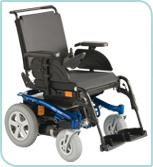 Battery on an electric wheelchair or mobility scooter won’t hold a charge – We had a disabled client traveling in Paris whose rental electric wheelchair (shown in the photo on the right) would not hold a charge. It was late on a Friday and the rental wheelchair provider was gone for the weekend. We were able to find a different wheelchair provider so he could continue his trip. You should always have back-up plans for every aspect of your trip, especially your mobility equipment!
Battery on an electric wheelchair or mobility scooter won’t hold a charge – We had a disabled client traveling in Paris whose rental electric wheelchair (shown in the photo on the right) would not hold a charge. It was late on a Friday and the rental wheelchair provider was gone for the weekend. We were able to find a different wheelchair provider so he could continue his trip. You should always have back-up plans for every aspect of your trip, especially your mobility equipment!
18) Lost in translation – A car rental employee in Nice told me I couldn’t return the car tomorrow because it was a “work day”. Eventually I figured out that next day was May 1….Labor Day! Arrange all your reservations in advance using English and your chances of experiencing similar problems will be very low.
19) Hiring a poor tour guide who just walks with you and recites the Rick Steve’s guide book – This actually happened to me in Istanbul. I started asking a lot of questions and she pulled out a Rick Steve’s guide book to check the facts…not a good tour! A similar thing happened in Barcelona when the tour guide I booked with was out of town and sent a friend to guide us who couldn’t even explain the history of the Roman wall we were looking at. Be sure that your tour guides are good ones!
20) Trusting a GPS system that has the one-way streets labeled the wrong way – My wife and I rented a GPS system with our car rental in Tuscany. In Pisa, it kept on steering us the wrong way down one-way streets! Be sure to bring maps for every city and every neighborhood you are going to visit as backup.
21) Inability to communicate your accessibility needs in the local language – If a local knows only a little bit of English, they almost certainly do not know English accessibility terminology like “grab bar”, “flat tire”, and “battery not charging”. When traveling with a disability in Europe, be sure to bring a list accessibility phrases with you on your trip.
communicate your accessibility needs in the local language -simple words will suffice.
22) Booking a private transfer who won’t wait for your delayed flight – This happened in Venice for a client who had their flight delayed. She arrived late with no accessible transportation waiting for her! When traveling with a disability, be sure that your accessible van drivers know your flight information and is tracking your flight before pickup.
23) Total loss of internet access – When were in Santorini, Greece, in 2010, construction was going on and the entire town lost internet access for two days. If I had needed to change a reservation for our next stop in Turkey, I would have been in big trouble. You should always have someone not traveling with you who can make reservations changes for you if needed.
24) 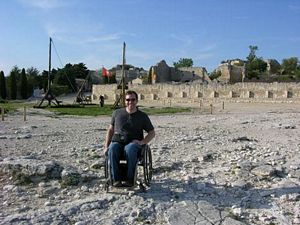 Visiting a city that is far less accessible than you expect – This happened to me in Les Baux, France. The medieval hill town had cobblestones in town and gravel in the fortress ruins (shown in the photo on the left).Fortunately on that trip, I had some strong friends with me! Be sure to research accessibility of all sites before you visit.
Visiting a city that is far less accessible than you expect – This happened to me in Les Baux, France. The medieval hill town had cobblestones in town and gravel in the fortress ruins (shown in the photo on the left).Fortunately on that trip, I had some strong friends with me! Be sure to research accessibility of all sites before you visit.
25) Trapped by the Venice flooding – This happened to a disabled client who unknowingly booked his trip during “high water” season. If he had spoken to us before booking his cruise, we could have warned him!
26) Have a tender boat break down on the way to the ship – What an adventure this was! Our cruise tender broke down half-way between the Mykonos port and our cruise ship. Those tenders will really start rocking when they’re not moving forward! Another cruise tender towed us to the ship and we didn’t get left behind!
27) Book through a travel agent who is not familiar with European accessibility – We often get requests from travel agents who don’t know how to plan an accessible trip to Europe. This travel agent had actually met the travelers but had never told us about his breathing problems! We got this feedback from a tour guide.
We just wanted to let you know that we had the Smith party on tour with us for the Original Florence Walk public tour this morning.
As you would have seen in Florence, the city is not well equipped for wheelchair users. I don’t know if you personally met Mr. Smith to know that he is quite a large, elderly man who has only 10% lung capacity, travels with an oxygen tank, and is not very agile. He and his wife had difficulty with the sidewalks, and several times the guide had to leave the group to get Mr. Smith back to the footpath ramps. Ms. Smith also had to stop to change the batteries on his breathing apparatus in the middle of the tour.
Our guide went exceptionally out of her way to accommodate Mr. Smith and luckily we had a full group of clients on the tour that were very understanding. Nonetheless, it was quite straining on the Smith party to actually do the tour, and also disruptive for the guide and other clients to have to provide such care to Mr. Smith.
Sage Travel Tip: Be sure your travel agent
has extensive experience planning accessible trips in Europe!
28) Choose a sidewalk route that has many steps – Some cities are so hilly that the sidewalks have steps! An example photo of Istanbul is shown on the left and a photo from Rome is shown on the right. If you can find a travel company familiar with the local accessibility, they can tell you which sidewalks and streets to avoid.
Rely on a local expert to tell you which sidewalks to avoid

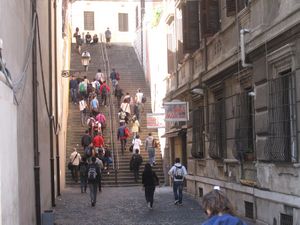
29) Transportation company shows up with a van without a wheelchair ramp
“When our plane took off from LAX, I had been up for nine hours. When it landed in London I had been up for twenty hours. I was looking forward to getting to the apartment we were staying at asap. Then I was blindsided by the car service that I had lined up weeks ahead of time. Our driver shows up, takes a look at my wheelchair and tells us he cannot transport my chair. He thought I had a folding chair. Even after I filled out a questionnaire that they sent me requesting all of the specs for my chair. I even sent them follow ups confirming that they knew about my chair size. Then, they even went as far as to blame me for the mistake. So we end up spending the next three hours trying to find an accessible taxi. Finally, with the help of my friends at Sage Traveling back in the states we arrange transport. Our taxi drivers, Mick and Eddie, see our distress and they take over. They took us through town and basically gave us “the tour” and then drop us at our flat.” – Don
30) Taxi Driver Strike and Protests – Choosing a centrally located accessible hotel can turn out to be one of the best travel decisions you make!
“Due to the taxi driver strike and protest over Uber that occurred two days before our arrival in Paris combined with the extreme heat, over 102 several days, finding a taxi on the street was impossible. However, because of the great location of our hotel we were able to roll to the Louvre, the Orsay and the Museum of Decorative Arts. I was also able to walk to the Hotel Deville and found a wonderful department store nearby. We finally ventured out by taxi to the Gallerie Laffeyette department store near the Opera House on Saturday morning. What a beautiful domed ceiling! I’ve never seen anything like it in a department store and all the luxury brands were on display and available for purchase” -Earl Graybeal
and when something goes wrong, you’re on your own!


